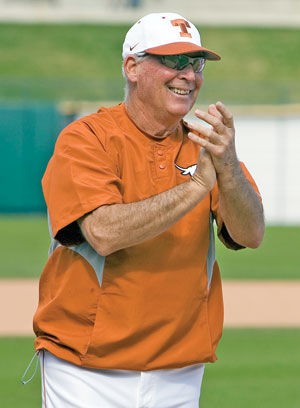The University of Texas baseball team generally travels to Stanford under better circumstances. Case in point: In 2009, the last time the two teams met at Sunken Diamond for their traditional early-season series, the Longhorns were riding an undefeated 10-0 record, and came through to take two of three games from the Cardinals.
This season is different, however. Leading up to their weekend series at Stanford, the No.2-ranked Cardinals entered unbeaten. Meanwhile, the Longhorns entered amid a mini two-game losing streak, including a shocker last Tuesday in falling 9-7 to unranked University of Texas-Arlington.
The upset to UT-Arlington caused Longhorns' manager Augie Garrido to alter his flight plans, allowing him to stay in Austin, Texas an extra day to travel with the team. A big audible to call so early in the season? Perhaps. But, it’s these types of decisions – seemingly minor, but ever so tactical – that have coalesced into Garrido’s legacy as the greatest coach in college baseball history.
An historic legacy
Garrido’s legacy, as he enters his 43rd year as a Division I head coach, can be summed up in one word: Winning. With 1,819 wins, he has recorded more victories than any coach in D-I history. He has won five national championships and is a five-time winner of the National Coach of the Year award.
His storied career has been chronicled in several formats, including the Richard Linklater documentary film "Inning by Inning: A Portrait of a Coach,” as well as, Garrido’s autobiography "Life Is Yours To Win.” Also, in the Kevin Costner film "For Love of the Game,” Garrido portrays the venerable Yankees manager who, in the ninth inning of Billy Chapel’s perfect game, orders young pinch hitter Ken Strout to: "wreck it.”
From humble beginnings
Yet, this legendary collegiate coaching career started at the Division-II level, at none other than San Francisco State, in 1969. Little did Garrido know that just one season later, he’d be hired at Cal Poly-San Luis Obispo, where he’d set out on the road to history.
"No, I had no idea where it was going to go,” Garrido said. "I did know I wanted to be a college coach. I did know that. That was my goal.”
A Bay Area native, Garrido grew up in Vallejo, as the son of shipyard worker in the hard-knocks, blue-collared town. Admittedly a poor high school student, he graduated from Vallejo High, the school that would go on to produce current Yankees ace C.C. Sabathia.
Garrido’s father was also a sports enthusiast, though, and a generous one at that. An accomplished player and coach in his own right, Garrido’s father worked nights at the city’s Federal Terrace Community Building. As Garrido recalls, his father coached everything from football and baseball to ping pong and pool, all the while with the young Garrido in his hip pocket.
From there, Garrido’s baseball career took off in a hurry. As a player, during summers between two years at Vallejo Community College – where he had to "make up for 12 years of not paying attention” – Garrido travelled via Greyhound Bus to San Francisco, where he would play ball by day, bus tables at a restaurant in North Beach by night and grew into a kinship with local baseball legend and restaurateur Dante Benedetti.
"The net of it was, there was a bigger world than the one I grew up in, and that I had a choice as to what I wanted to be, where I wanted to be and that I wasn’t designated to work on the shipyard and live in a housing project. So, it meant a lot to me,” Garrido said.
He stepped into an even bigger world from there. Before becoming a mainstay in Omaha as a coach, Garrido appeared in his first College World Series as a player at Fresno State in 1959 – the first time the Bulldogs ever advanced to the elite national championship bracket.
Inroads to annual series
Following a six-year minor-league career, which spanned from 1961-66, Garrido finished his playing career in a semipro season with the Eureka-Humboldt Crabs. The team featured an array of talent, including an 18-year-old first baseman named Mark Marquess.
Now in his 36th season as Stanford’s manager, Marquess recalls, with a smile, the year he met then-teammate Garrido, in a season Eureka-Humboldt advanced to the semipro championship series in Wichita, Kan.
"When he joined that team, I got to know Auggie, and he was a great player,” Marquess said. "We’ve been friends ever since.”
Now, the annual non-conference matchup between Texas and Stanford stands as a legacy to their enduring friendship. The teams have played every year dating back to 1998, Garrido’s second season with the Longhorns. Prior to that, the two paired up annually during Garrido’s two epic tenures with Cal State Fullerton.
"I’ve known Mark Marquess for a long time, and have tremendous respect for him,” Garrido said. "So, that started between Fullerton and Stanford, and then when I came to Texas, we moved it over here.”
Recommended for you
Yet, Garrido’s inroads with Stanford started in Marquess’ final season as a player with the Cardinals, in 1969. In the first college game Garrido ever coached at San Francisco State, the Gators’ opponent was none other than Stanford, at Sunken Diamond.
Building greatness
Amid an era of ongoing protests over Ethnic Studies at San Francisco State, Garrido quickly saw success by posting a 25-14 record. In addition, he coached the Gators’ freshman football team, which he said was "fairly typical in those days at state schools.”
As for tensions on campus, the San Francisco State student strike of 1968 indirectly financed the baseball team. According to Garrido, the team managed to make thousands of dollars selling coffee and sandwiches on campus throughout the year. The money went to pay for travel and new uniforms.
After one season at SF State, Garrido was snatched up by Cal Poly, where he served as head coach for three seasons. In 1973, he took over at Fullerton. Two years later, in 1975, Fullerton made its first trip to the College World Series. Garrido said exhibiting fundamentals was what helped build the Fullerton legacy, one that was solidified with its first national championship in 1979.
"We weren’t going to get the best players [in those early years],” Garrido said. "So, how were we going to beat the teams that had the best players? There was only one way. To play the game better than they could. How do you do that? By having more knowledge of teamwork and how to play the game, not just raw skills.”
Building great players
From Mike Krukow at Cal Poly, to Huston Street and Brandon Belt at Texas, Garrido has directly affected the destinies of many a future major leaguer. In the cases of Krukow and Belt, both converted to new positions at the bequest of Garrido.
Krukow started his college career as a catcher, but soon transitioned to the mound with the help of Garrido and Cal Poly pitching coach Berdy Harr. Krukow would go on to set the school’s career ERA mark, a record he still holds. And, as a major leaguer, he was a 20-game winner in 1986 with the Giants.
Street followed a similar path at Texas. As a two-way player, his hitting as a third baseman left something to be desired. He excelled on the mound, though, saving 41 games throughout his collegiate career, including being named Most Outstanding Player at the College World Series, as part of the 2002 Longhorns national championship team. And, though Street toyed with the idea of converting to the starting rotation, Garrido liked him better as a closer. As a major leaguer, Street is still a closer, and currently owns 178 career saves.
"He just talks the way he thinks, and the way he thinks is deep,” Street said of Garrido. "It’s very forward thinking, but at the same time, usually it’s dead on. I tell all his players: ‘You’re foolish if you don’t listen to this man.’ He’s the winningest coach in baseball history for a reason.”
Brandon Belt actually started his collegiate career as a pitcher, and also saw some time as a designated hitter. But, no sooner did he transfer to Texas, did Garrido directly facilitate Belt’s conversion to first base. The big lefty would go on to lead the Longhorns in batting in 2009, before being drafted by the Giants.
"We were out there every single day early ... and Augie was out there helping me,” Belt said. "Augie does a whole lot of stuff with the infielders. So, he was mainly out there with me, just teaching me the ins-and-outs of playing first base, and helping me hone my skills out there. And, it helped a lot.”
And, it’s Garrido’s straight-shooting demeanor that not only warrants such astonishing results, but also earns the respect of his players.
"He’s very personable, and a very genuine person,” Belt said. "He’s going to let you know how he feels. He expects the best out of you, and he’s going to make sure he gets the best out of his ballplayers.”
It’s how you finish
It was a long, torturous weekend for the Longhorns, as they were swept by Stanford, including a 15-1 blowout in yesterday’s finale. Currently hitting just .184 as a team, it’s hard to imagine a worse start. Add to that, Texas has completely revamped its weekend rotation after losing Cole Green and Taylor Jungmann to the draft, as well as losing Sam Stafford – a senior lefty who was drafted by the Yankees in the second round last year, but opted to return to school – to injury for the season.
Keep in mind, though, the last time the Longhorns turned over their entire weekend rotation was in 2005 – the year in which they went on to capture their last national championship.
Garrido agrees with the adage: It’s not how you start, it’s how you finish. And, this season, the greatest coach in college baseball history looks to build a winner in the same manner he’s built his prestigious career – by building on the fundamentals, from which, he has shown time and again, that talent does flourish.
"[Fundamentals are] what the game is made of,” Garrido said. "It’s what controls consistency ... and the fundamentals bind together the people that are playing together into a team.”
























(0) comments
Welcome to the discussion.
Log In
Keep the discussion civilized. Absolutely NO personal attacks or insults directed toward writers, nor others who make comments.
Keep it clean. Please avoid obscene, vulgar, lewd, racist or sexually-oriented language.
Don't threaten. Threats of harming another person will not be tolerated.
Be truthful. Don't knowingly lie about anyone or anything.
Be proactive. Use the 'Report' link on each comment to let us know of abusive posts.
PLEASE TURN OFF YOUR CAPS LOCK.
Anyone violating these rules will be issued a warning. After the warning, comment privileges can be revoked.